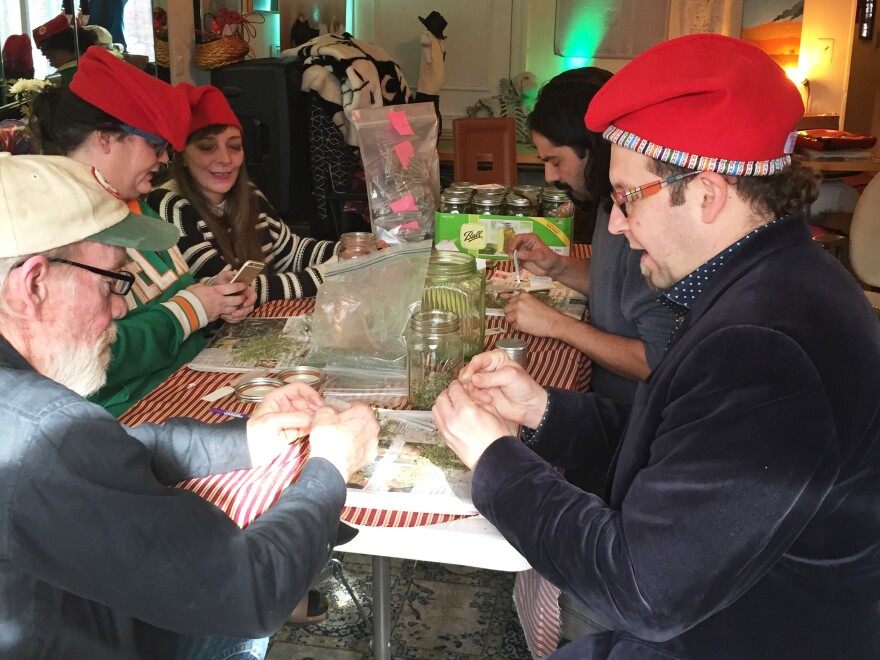While supporters of Donald Trump prepare for Friday's inauguration, so, too, are thousands of protesters.
Several dozen attended a training session this past weekend, run by a group called DisruptJ20. The group opposes just about everything the incoming administration stands for. Its goal is to disrupt, if not stop, Trump's inauguration.
Trainer Robby Diesu has everyone line up with a partner to show how it can be done nonviolently. He tells one side to be the protesters and the others to pretend they're Trump supporters — "who just drove eight hours to get here and to see President Trump become president, and you've come upon a protest that is preventing you from getting there," he says. "So, ready, set, go!"
Things quickly deteriorate as "protesters" and "Trump supporters" start yelling at each other, and even shoving.
Diesu gives the group tips on how to de-escalate a tense situation. First lower your voice, he advises, and never touch your adversary. He also says to try to be calm, and keep your hands in front of you so no one thinks you're hiding anything, like a weapon.
DisruptJ20 plans to blockade or protest at every security checkpoint along the Inaugural Parade route. Many here are antsy about going public and won't share their full names, as the group has received a number of online threats.
Kate is with a group promoting LGBTQ rights that plans to dance, spread glitter and hand out rainbow flags at one of the checkpoints.
"[We're] showing people who are trying to attend the inauguration that we're not going away," she says. She adds that protesters want to make clear that they'll fight efforts to repeal laws protecting their rights.
This will likely be one of dozens of protests around the city. Anti-war groups will gather along the parade route. Thousands of pro-Trump supporters will be there as well. One group, Bikers for Trump, has warned that they'll form a "wall of meat" to prevent protesters from spoiling the event, which has raised some concerns about violent confrontations.
But at least one inaugural protest promises to be very mellow.
Adam Eidinger and several volunteers have been rolling piles of marijuana into cigarettes in his dining room in Washington, D.C. They plan to hand out 4,200 joints ("420" is code for smoking marijuana) for free on Inauguration Day.

Eidinger is with DC Cannabis Coalition, which led a successful effort to get home use of marijuana legalized in the District. They don't want the new administration to turn back the legalization gains made here and elsewhere in recent years.
So after the give-away, they're suggesting people light up four minutes and 20 seconds into Trump's Inaugural address to make a statement, although it's illegal to do it outside.
"It's actually saying, we're here, we're a community, we're not going to be cowered. We just won eight out of nine ballot initiatives as a community in this last election cycle. We're more popular than either one of the two presidential candidates in all the public opinion polling," Eidinger says. "Why are you still putting us in jail?"
This week's biggest protest won't be on Inauguration Day itself, but the day after, when the Women's March on Washington is expected to attract some 200,000 people from around the country.

"We're going to have musical performances. We're going to have spoken word. There are some people that have been working with us in the movement for quite some time that will be on that stage performing. We'll have gospels," says Carmen Perez, one of the organizers.
Perez says more than a protest against Trump, the march is a chance for women to show their political clout. After the rally, they'll march a mile and a half, probably toward the White House. Many participants have said they fear that things they care about — like reproductive rights and racial equality — are threatened by both the new administration and Congress.
Perez says the initial goal is to be heard.
"If they don't continue to listen to us and if they're trying to take away some of our rights, we'll come back," she says.
Like the other protesters, she says they're not going away, that this is the beginning not the end.
Copyright 2021 NPR. To see more, visit https://www.npr.org.




